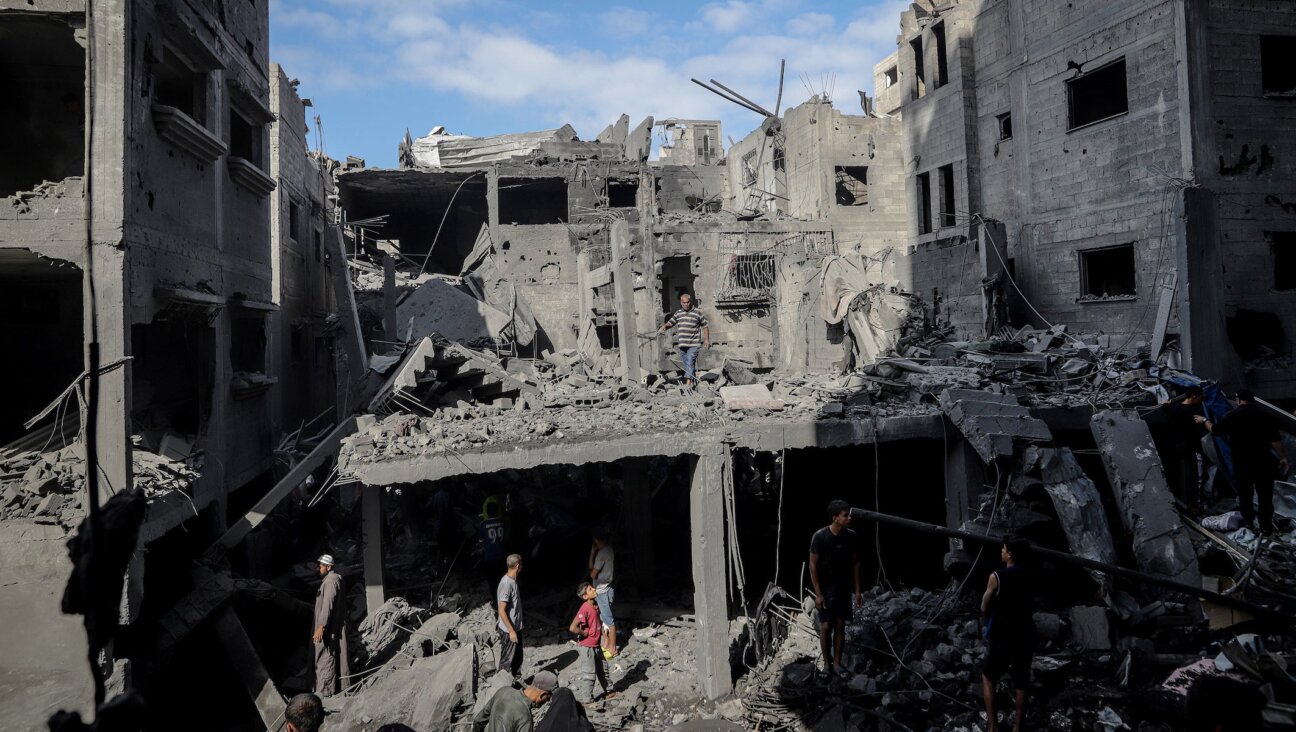Hungary Under Jobbik Still Coming to Terms With Nazi Era

Graphic by Angelie Zaslavsky
Two plaques put up in the village of Mád last month commemorate the important role Jewish families played in making Hungary’s golden Tokaj wine, most of whom perished in the Holocaust.
The plaques mark another step in Hungary on a painful journey in coming to terms with the treatment of its Jews during World War Two when most were handed over to the Nazis.
As the Forward reported in May, the current owners and the Jewish owners from before the war had been in a dispute about recognition of the former owners.
After two centuries of prosperity generated from the sweet wine that became popular in the courts of Europe, Jews in Tokaj were deported with the help of the Hungarian Gendarmerie to a ghetto and from there to Auschwitz concentration camp.
The plaques were mounted on the former home of the Zimmerman family, one of the biggest and most successful winemakers and wine traders of Mád in the northeast of Hungary, after a lengthy campaign by family members.
From the Zimmermanns sent to Auschwitz from their home in Mád only Susy Oster, who was born Zsuzsanna Zimmermann in 1928 and now lives in the United States, escaped the gas chambers.
But when asked if her mother had found some peace now that her family home in Mád was remembered, her daughter Beverly Fox said in an emailed response to Reuters:
“No, it has not given her any peace.
“How can it when everything that generations of her family toiled for, and not just her family, but all Jewish families, had everything taken away from them? How can you ever have peace after your country deports you … and sends you through the gates of hell?”
The central European nation deported half a million Jews. In the final months of the war, Hungarian fascists executed thousands of Jews, shooting them and pushing them into the Danube river.
From the village of Mád, around 250 Jews were deported. Their properties and vineyards on a plain of volcanic soil near the Carpathian mountains were mostly confiscated.
Fox recognized her mother’s home in a photo of the wine-making company Royal Tokaji, which now owns the buildings, when she was planning a trip to Hungary and the family embarked on a mission to gain recognition of the area’s Jewish roots.
Around 30 Jews returned to the village after the war but they had all left by the 1970s and today there is not a single Jewish family living in Mád.
Alongside the plaques, however, there is a push to rediscover the wine-making region’s Jewish roots. Hundreds of Hasidic Jewish pilgrims flock annually to Mád to visit the Baroque synagogue and the newly restored rabbi’s house.
The plaques marked the first time that any Jewish family was given public recognition in Tokaj.
“This is a unique story: as far I know this is the first time that a (Jewish) family is remembered this way with a plaque in the Tokaj region,” Mariann Frank, who leads a project to revive the region’s Jewish traditions, said.
“If we face this openly, and put up as many signs as possible to commemorate the really once flourishing Jewish winemakers and wine traders of the region, I think the region and the country would benefit,” Gabor Banfalvi, who runs tours of the region, added.
The region is a UNESCO World Heritage Site, and attracts tens of thousands of tourists each year, among them descendants of the Jewish families who once lived there.
“WINE OF KINGS”
The Tokaj region produces one of a handful of wines around the world made with fruit affected by “noble rot”, induced by the “Botrytis” fungus that shrivels grapes and concentrates their sugar. The flagship is Tokaji Aszu.
Paired with foie gras, blue cheese or desserts, Tokaj wines are valued for their richness and complexity.
Tokaj’s Aszu wines first appeared in literature in 1576 but it was in the 17th century that the wine became a favorite of wine connoisseurs.
Louis XV of France who served it to his famous mistress Madame de Pompadour called Tokaji the “Wine of Kings, King of Wines.” Royalty, writers and composers including Peter the Great, Goethe, Liszt and Schubert were all devotees.
The first Jews arrived in Mad in the early 1700s. As the trade in Tokaj wines flourished, the Jewish community became more established around Mád with the building of the synagogue and the setting up of a school for rabbis.
After World War Two, Zahava Szasz Stessel in the book “Wine and thorns in Tokay Valley” recounts how survivors returned home to find their houses occupied and their possessions taken.
During the communist years, the vineyards were used for mass production and run by cooperatives to slake the thirst of the Soviet Union and other states but when that era ended foreign investors moved in to restore the wine’s quality.
IMPORTANCE OF THE PLAQUES
Royal Tokaji Wine Company was founded by British wine writer and expert Hugh Johnson. Another investor in the firm was Jacob Rothschild of the banking family.
The Zimmermanns contacted the company last year and after lengthy negotiations, the plaques were put up. Fox described the process as “extremely hard”.
Royal Tokaji General Manager Charlie Mount told Reuters that it was quickly established that some of the buildings that house the company’s offices had been owned by the Zimmermanns.
“There was some difficulty with the records in deciding and agreeing exactly which of those buildings had been owned by the Zimmermann family,” he said.
Mount said the family had not asked for the buildings to be returned to them. Fox said that her mother in the past had considered asking for reparation from the Hungarian state but had never lodged an official request.
“Susy did think of asking for restitution, but the Hungarian government was not giving any,” Fox wrote in an email.
A Hungarian government spokesman said the land compensation process in Hungary in the 1990s was based on the principle of compensation. “The compensation process has been closed, no new claims can be lodged,” the spokesman’s office said, adding that individual annuity compensation payments continued for survivors.
Mount also said that it was a long and sensitive process to agree to a wording on the plaques that reflected history accurately and also met with the family’s approval.
“This is the family story we are telling and it was very important to get that correct. And that was difficult, it was a long process and I think it should be a long process because these are important matters that have to be correctly reflected,” Mount said.
The plaques now say that from the early 1800s, through generations, the Zimmermann family produced and traded wines in Tokaj. “In May 1944, the family was deported to Auschwitz along with other Jewish families of Mád,” the inscription reads.
In an interview recorded by the Holocaust Memorial Museum in Washington in 1994, Susy Oster recalled her childhood in Mád as an idyllic period which ended suddenly in May 1944.
“We were taken to this very old beautiful temple … the whole population of Mád was confined to the temple for one night,” she said. “The next morning we were walked through our town to the railroad tracks and put on a train.”














